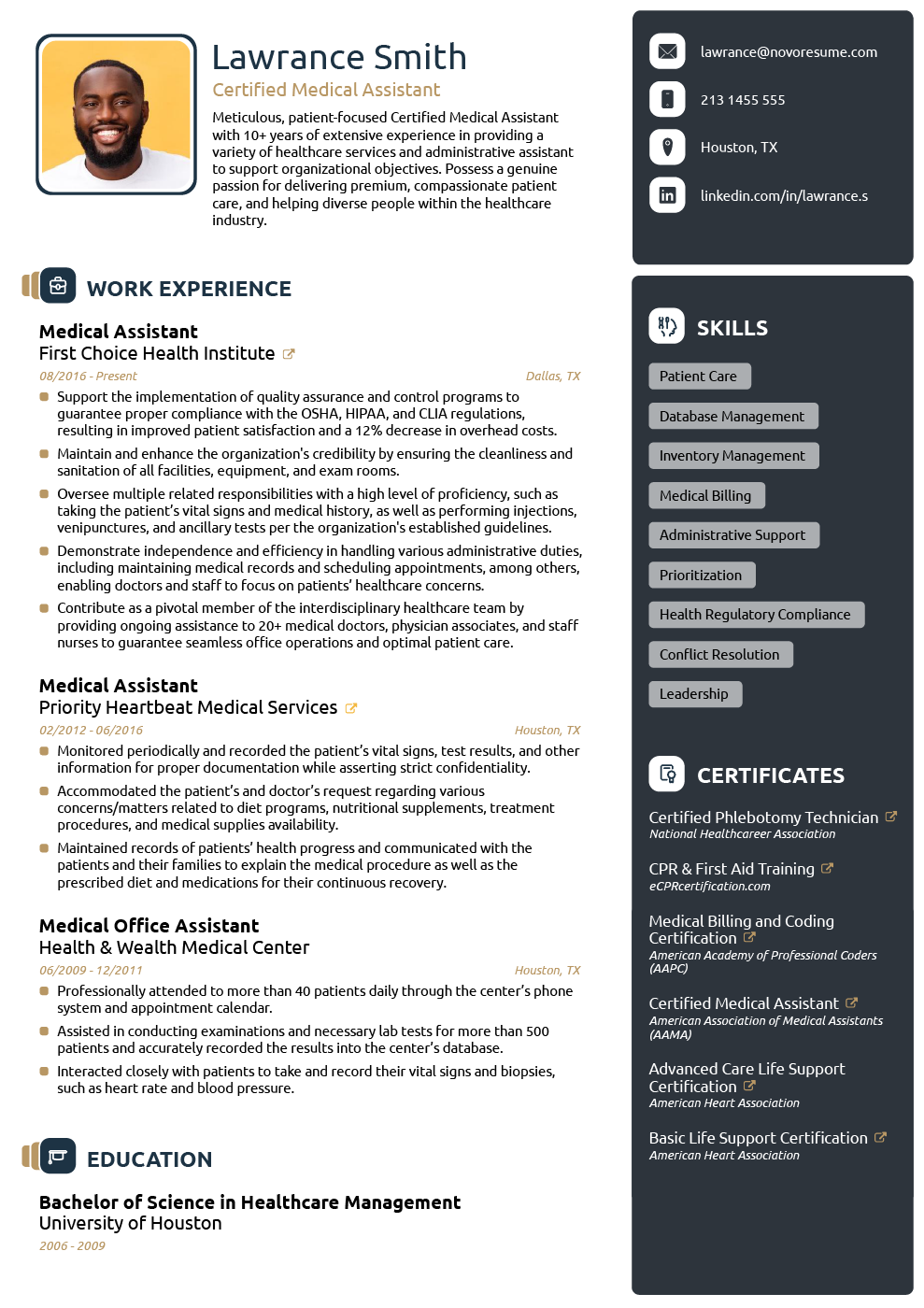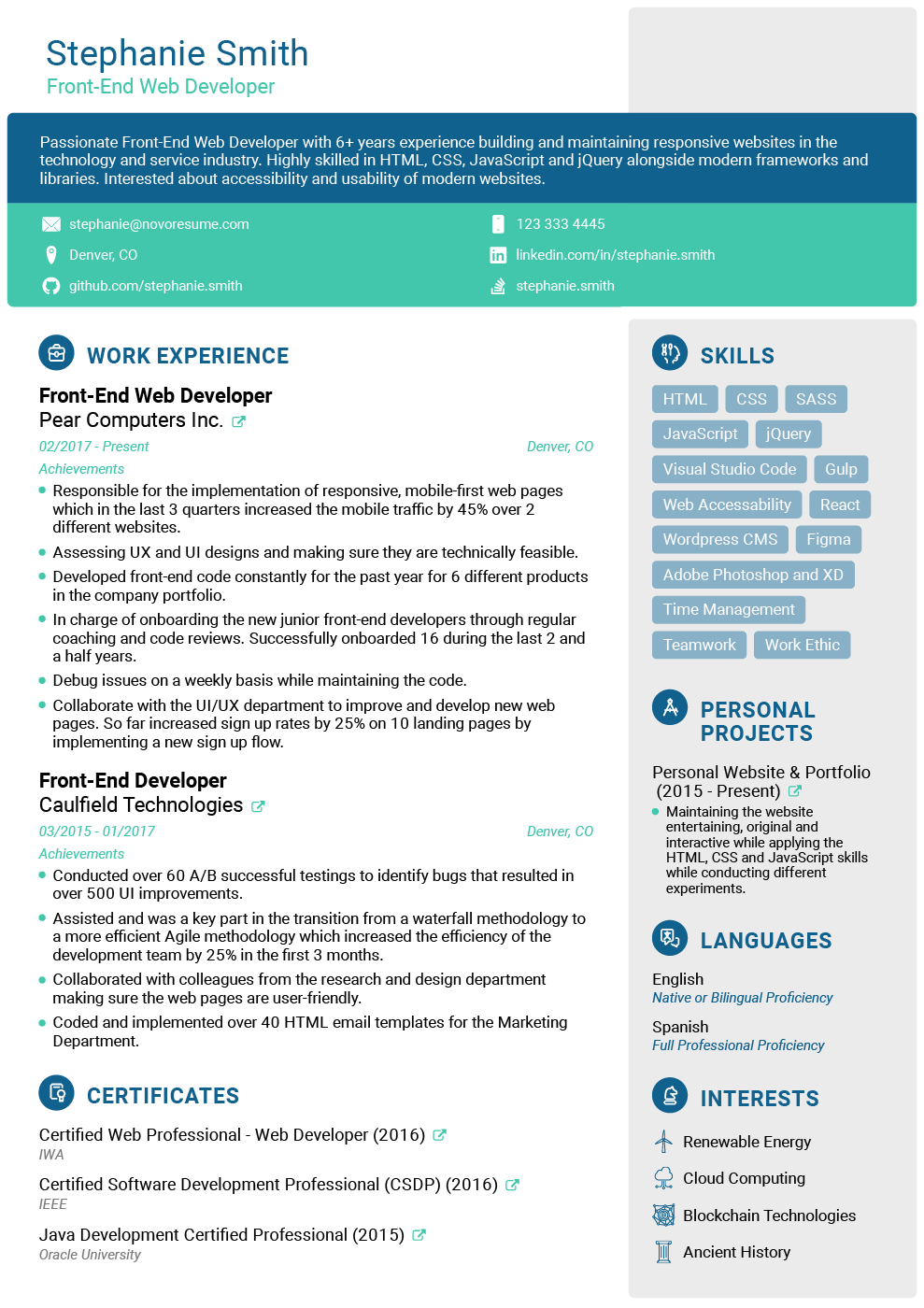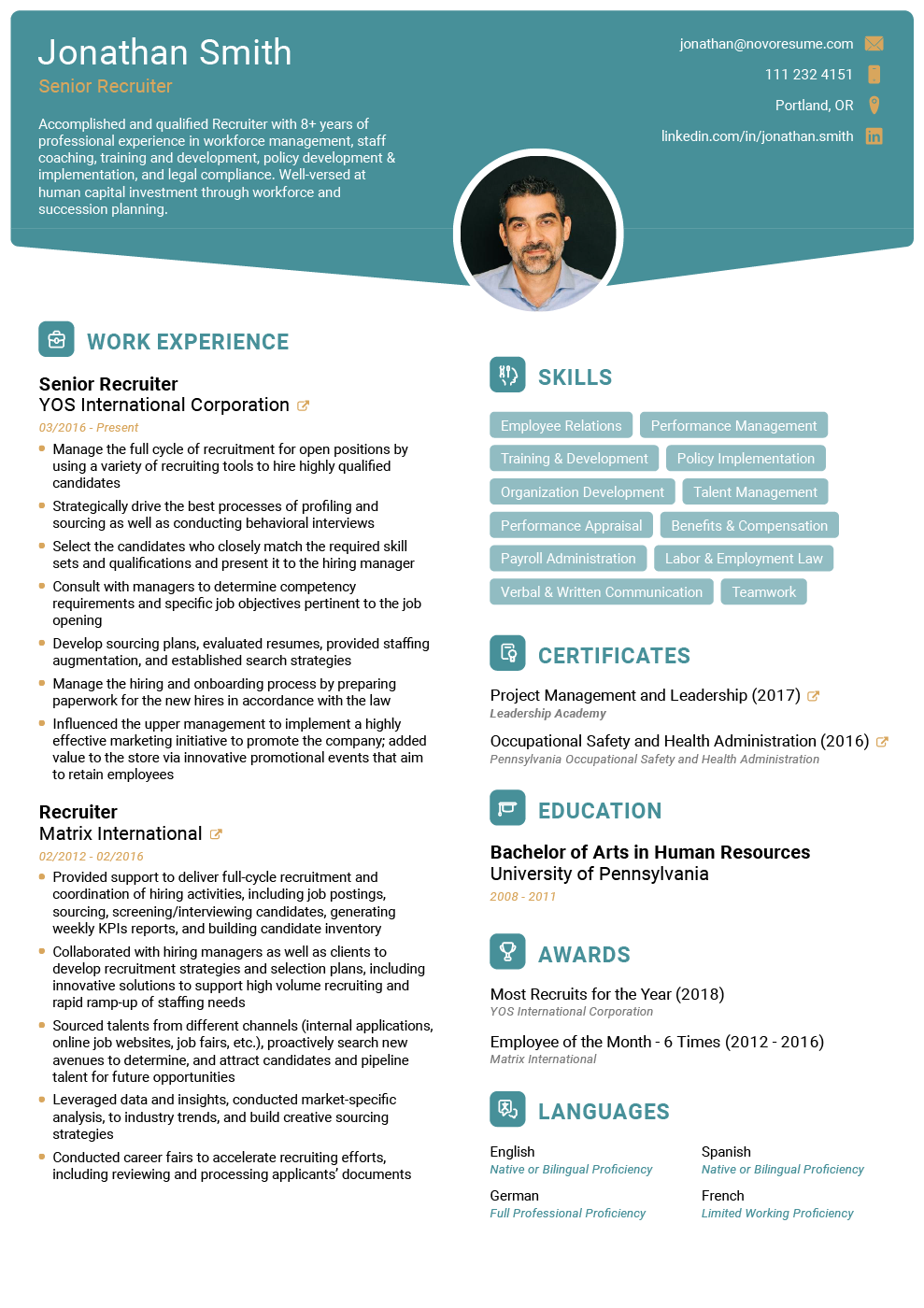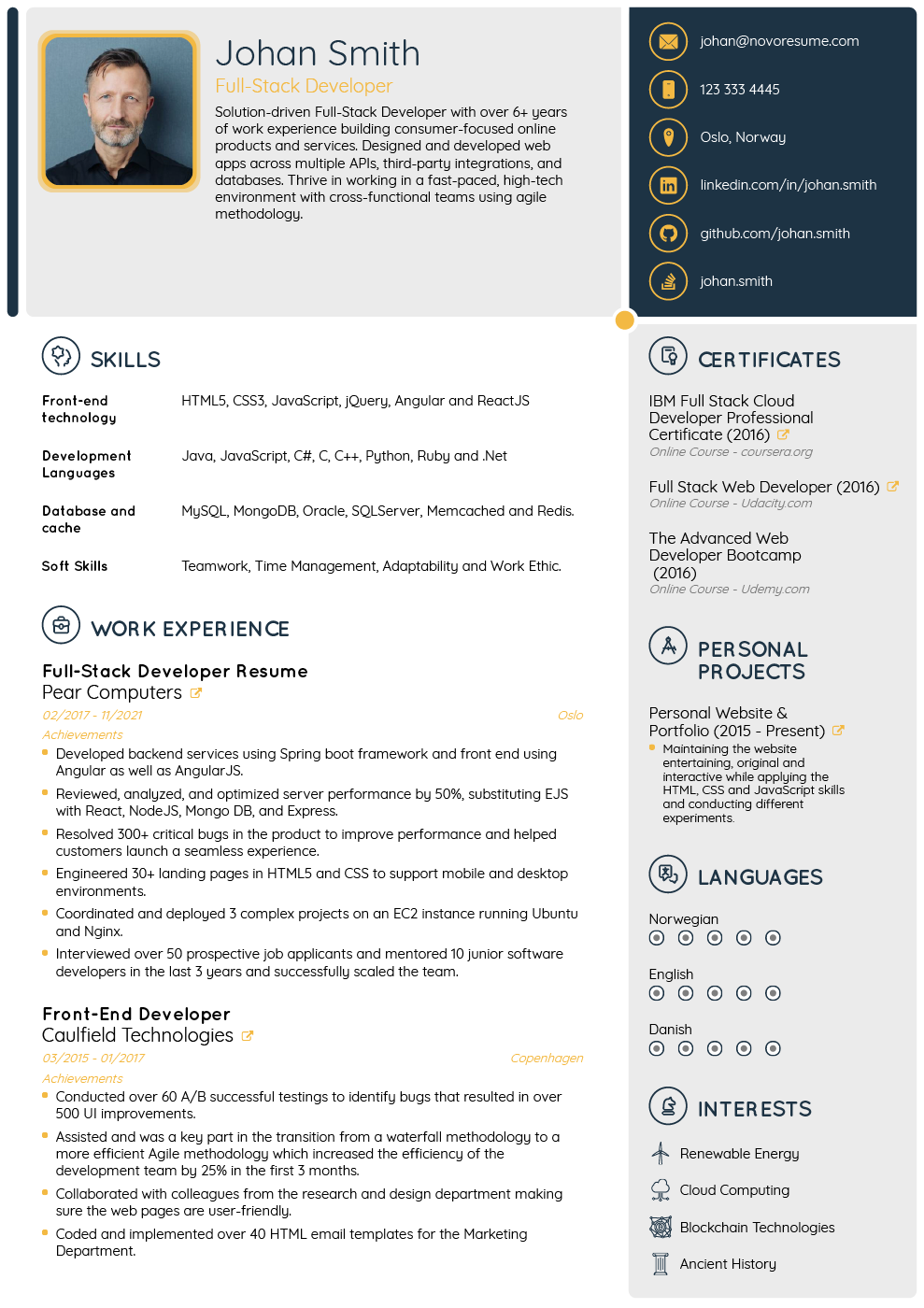Want to include certifications on your resume, but not sure how?
We don’t blame you - it’s not as simple as it seems.
If your certifications are critical for the job, it’s essential to include them on top of your resume in the summary or contact information section, or you risk the recruiter skipping over your resume entirely.
Or, if they’re not, you should create a dedicated section for all your important certifications instead of cluttering up your other sections.
And in this article, we’re going to teach you how to do all that!
Want to skip all the hassle of creating a resume from scratch? We got your back. You can choose any of our free resume templates to get a professional and modern resume without breaking a sweat.
What Are Certifications?
Certifications are documents awarded by accredited institutions, such as boards, associations, or professional organizations.
Obtaining any certification shows that you possess or that you’ve developed a certain skill or that you’ve reached a certain level of technical proficiency.
To get a certification, you typically need to be able to meet certain requirements and criteria, pay a fee, or even pass an assessment test at times. The harder a certain certification is to acquire, the more likely it is to give you an edge over other candidates for the job.
Based on your profession, there are countless certifications out there. Here are some popular examples:
- CompTIA A+: Popular certification for information technology professionals.
- PHR: The HR Certification Institute awards this certification to HR professionals who have mastered both the technical and personal aspects of human resource management.
- NCLEX-RN: Registered nurses, nurse practitioners, and nurse assistants can obtain this certification from their state’s Board of Nursing.
Why Get Certified??
As we already mentioned, earning a certification shows that you’re devoted to your field of work and provides evidence of your skills and work experience.
In a nutshell, adding a professional certification to your resume is undeniable proof that you’re competent in a specific skill or field of work. In some positions, certification might be a mandatory requirement for simply being considered for a job.
For other roles, it can be an added bonus that helps you stand out amongst other equally qualified candidates.
Even if the certification isn’t a requirement to get the job, it can certainly do the following for your job hunt:
- Boost your resume
- Draw attention to your application
- Prove that you’re a valuable hire
When to Include Certifications on Your Resume
While certifications are not mandatory on a resume, there are some cases when you should definitely do it if you want to take your resume from good to great.
Here are some of those cases:
#1. The employer requires it
This is probably the top reason why you should include certifications on your resume - they’re a must for the job.
If a potential employer lists a certain certification in the job description and you fail to include it on your resume, the hiring manager may disqualify you on the spot.
As such, make sure to check the job ad and company website thoroughly before you submit your application for any job opening.
#2. To demonstrate your skills
In certain situations, a certification may not be required for the job, but still prove invaluable to your application.
Let’s take, for example, computer skills. They’re a must for most jobs today, whether or not they’re in the IT field. So, if you’re applying for, say, an office assistant position and you list an IT-related accreditation, the hiring manager will know that you’re also great with computers.
Compared to other candidates with similar experience, this certification may be enough to give you the upper hand in the hiring process.
#3. To highlight your industry knowledge
Another great reason to include your certifications in your resume is if they can further highlight your years of experience in a certain industry.
As we already mentioned, some certificates can only be obtained if you’ve worked a certain number of years in the field. In turn, listing such certifications on your resume can be an additional “voucher” for your experience.
#4. To make up for limited practical experience
Certifications can also be used to make up for the lack of work experience.
Let’s say you’re a recently graduated graphic designer with little professional experience in the field. However, you’ve practiced graphic design a lot in college, as well as in your free time, and have gained the necessary skills for the job.
In such a case, listing a graphic design-related certification may be able to balance out your lack of work experience.
How to List Certifications on a Resume
Now that you know all about certifications, including how they can benefit your resume, it’s time to learn how to add them to your resume the right way:
How to Format Your Certifications
In 90% of cases, you should create a dedicated resume section to list your certifications.
Here’s how you’d format such a section:
- Add the title of the certification. List the full title of the certificate underneath the section header as a bullet point. Make sure there are no typos in the title and that any abbreviations are spelled out.
- Include the name of the awarding organization. Adding the name of the organization or institution that certified you can make the certificate much more legitimate. Here too, make sure to double-check for any spelling errors.
- List the date you earned your certification. Additionally, make sure to add the date your certificate was last renewed, in case it’s a certification that requires renewal. If you’re in the process of obtaining a certification, you can list it on your resume by including the anticipated obtainment date.
- List the date your certification expires. In case your certification has an expiration date and you still haven’t renewed it, add the expiration date too. It goes without saying that you shouldn’t add expired certificates to your resume.
- Provide details (optional). If the space allows it (remember, your resume should optimally be one-page-long), add a sentence describing the skills related to the certification. This can help the hiring manager see how it’s relevant for the job.
Where to Add Certifications to Your Resume
There are several places where you can add your certifications to your resume. As mentioned above, the most common one is under a dedicated “Certifications” section.
Alternatively (and depending on how important the certification is for the job), you can also use these three resume sections to list them:
- Your resume summary
- Your contact information
- Your education section
Let’s go through each possibility in more detail:
#1. List certifications under the “Certifications” section
Every resume contains mandatory sections (e.g. contact information, work experience, resume summary, skills) and optional resume sections (e.g. internships, volunteer work, hobbies and interests, etc.).
Certifications belong to the latter group as, in most cases, they’re not required for most jobs. That said, certifications are among the best optional sections you can add to your resume.
Creating such a section is fairly easy.
Firstly, position this section after all your essential sections, as such:

Then, create a heading on your resume named “Certifications” or “Certificates” and format all relevant certificates according to the formatting rules we outlined above.
One thing to keep in mind is that you should list your certifications in reverse-chronological order. Start with the most recent certificate and make your way from there.
Here is a real-life example of a “Certifications” section done well and one done not so well:
Certifications
First Aid Certification
American Red Cross, July 2018
Expires: January 2020
Skills acquired: CPR
Certifications
First Aid Certification
ARC, 2018
#2. List certifications In your resume summary
If you have a certification that’s required or super relevant for the job, you can also include it in your resume summary section.
For example, if you're a certified accountant, you can mention it in your summary as follows:

Just add one line and you're already one step ahead! You don't even need to rework your existing summary, just start or end the first sentence with the certification’s title.
For example:
- Certified CPR sports teacher with 15+ years of experience and solid organizational skills, seeking to preserve and improve the quality of sports education at Amigos Children's Academy. At Jefferson Elementary, raised sports team national results by 12% and led an exhibition team at the 2019 World Aquatics Championships.
- Data analyst with 7+ years of experience analyzing business processes. Enthusiastic to handle big data interpreting and visualizing skills at 7EDGE. CCA certified in 2013.
If you really want your certification to be the first thing the employer sees, you can even include it in your contact information section, or as part of your job title.
Here’s what we mean by that:

#3. List certifications in your education section
Finally, you can also include your certifications in your resume’s education section.
This, however, is not a popular choice and you should only do it if:
- You only have one certification (and it’s not job-critical)
- You took your certification courses throughout your university years
- You want to list less important certifications outside the designated certifications section
Here’s what that would look like on a resume:
Education
Healthcare School of Hawaii, Aiea, HI
08/2013 - 05/2017
- Certified Nursing Assistant (CNA) 2017
- Learned to assist healthcare providers with medical procedures while obtaining vital signs per protocol, feeding and bathing patients, and dressing wounds.
5 Examples of Certifications on Resumes
Here are some examples of certifications on resumes for different positions, using our tried-and-tested resume templates:
#1. Certified Medical Assistant Resume Example

#2. Web Developer Resume Example

#3. Recruiter Resume Example

#4. Flight Attendant Resume Example

#5. Tech Resume Example

10 Top Certifications That Can Boost Your Career
Some of the most popular certifications you can acquire in 2023 are as follows:
- PMP Certification. The Project Management Professional is a global certification offered by the Project Management Institute for project managers.
- BC/BE. This certification stands for Board Certified/Board Eligible and is given to physicians who have completed their residency but haven’t passed their board exam.
- PALS Certification. Pediatric Advanced Life Support is for professionals who want to specialize in caring for infants, children, and adolescents.
- Forklift Certification. The Occupational Safety Health Administration offers training and then a license to safely drive heavy machines like forklifts inside warehouses.
- Scrum Master Certification. Scrum is a framework for managing complex projects and this course offers an entry-level credential to show professionals have an understanding of the methodology.
- Certified Nursing Assistant. The CNA certification is state-specific and is a must-have for anyone who wants to work in patient care.
- First Aid Certification. This certification provides the necessary knowledge to react effectively in emergency situations before the medics arrive. This includes stitching deep cuts, addressing injuries, and even handling broken bones.
- ASE Certification. The National Institute for Automotive Service Excellence offers the Automotive Service Excellence certification to test and certify a mechanic’s skills and abilities.
- CPR Certification. The most commonly requested certification from employers, this Red Cross certification can come in handy for pursuing a number of job opportunities that are not limited to the medical industry (e.g. teaching jobs, public-facing roles, and even companies can benefit from employees being CPR-certified).
- CISSP. This is one of the most popular network security certifications, perfect for information security professionals who already have a few years of experience and want their skills to be globally recognized.
Resume Certifications FAQs
Still have some questions? You’ll find your answers in this section!
1. Should I list online course certifications on my resume?
Yep! As long as the certifications are relevant to the job, you should include them on your resume.
Online certifications can especially help you if you’re a recent graduate with not a lot of work experience.
2. Is there a situation when I DON’T list certifications on my resume?
Definitely! You should only add certifications that add value to your resume.
If you’re a business analyst, for example, a Certification of Competency in Business Analysis (CCBA) WILL help get you hired.
A bartending or CPR certification, though, won’t.
You also shouldn’t add certifications that are outdated (for obvious reasons) or ones that are just not that significant.
For example, if you’re a business analyst with 10+ years of experience, you shouldn’t include your business management certificate you got from some online course sometime in college.
So, to sum it up, you can skip certifications that are:
- Outdated
- Irrelevant
- Insignificant
3. What other sections can I list on my resume?
You can add a lot of interesting optional sections to make your resume even more competitive, such as:
- Awards, Honors, Accomplishments
- Volunteering and Associations
- Extracurricular Activities
- Independent Projects,
- Hobbies, Interests, Languages
- Publications, Training, Conferences
Make sure, though, not to over-clutter your resume, or get it to spill over to page 2.
Look at it from the recruiter’s point of view - which of these sections would add value to you as a candidate and show that you can do the job right?
Then, choose accordingly.
Key Takeaways
Now, let’s sum up everything we’ve learned about certifications in your resume:
- Adding a professional certification to your resume is proof that you have the competence to do something.
- Put job-critical resume certifications in four places, such as in your personal information section, in your resume summary, in your education section, or in a designated certification section.
- Always make your most noteworthy or relevant certifications visible and attention-grabbing.
- Don't include certifications that are outdated, irrelevant, or insignificant on your resume.
Looking for more industry-leading career advice? Make sure to follow our career blog!



